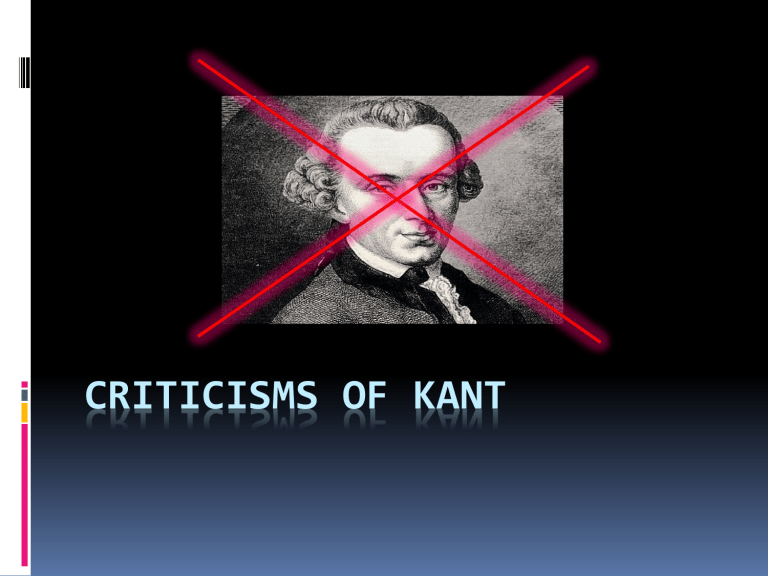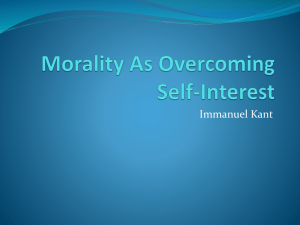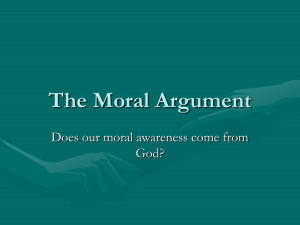Criticisms of Kant - The Richmond Philosophy Pages

CRITICISMS OF KANT
What Makes An Act Moral?
A major difficulty for Kant’s theory is that it seems that not every universal maxim is a moral one – it could be trivial or amoral
This shows that not every maxim that passes universability is a duty
Kant does not tell us how we can distinguish moral duties from absurd imperatives for surely it is possible to universalise the maxim ‘never step on the cracks in the pavement’ – it is not inconsistent to will everyone to do so
Similarly, it is not clear how Kant could distinguish moral obligations from social etiquette – someone could easily will everyone to eat with a knife and fork and be outraged at the thought of some adults using their hands or just spoons
Also, there are some maxims which cannot be universalised on Kant’s account and as such must be morally wrong for example ‘using contraception when having sex’ is a maxim someone might have if they don’t want children. But this cannot be universalised because there would soon be no human species
It Doesn’t Fit With Our
Intuitions
There are aspects of Kant’s theory that fall clearly outside of our ‘moral intuitions’
For example, Kant’s scenario where a madman is at your door with an axe asking if your friend is inside goes against our moral intuitions. Surely it is more moral to lie than allow someone to be brutally murdered but according to Kant and the categorical imperative it is your duty to tell this madman the truth. Our actions here lead to a murder – how can this really be moral?
It Doesn’t Tell Us How To
Act
Another objection is that Kant’s approach is impractical because it provides no substantive help in making moral decisions when we are faced with moral dilemmas
The Categorical Imperative does go some way in this direction but if we encounter conflicts between different duties Kant offers no way for us to choose
Jean-Paul Sartre criticises Kant by using an example of his own experience during the Nazi occupation of
France – here a young man is torn between his duty to his country, which impelled him to join the resistance and which would probably lead to his death, and his duty to his mother, who had already lost her other sons to the war
Kant’s ethical theory is of no use in helping him to resolve this conflict since both imperatives are categorical and yet they pull in different directions
Kant seems to have believed that genuine moral dilemmas of this sort could not occur, but the reality of our everyday experience shows that this is not the case
A Response??
W.D. Ross tries to address the problems levelled at Kant’s deontological theory that it is counter-intuitive and impractical
Ross believes that through a process of experience and intuition we build up a collection of moral principles
He calls these principles ‘prima facie duties’ and they include all the usual suspects: beneficence (the obligation to promote the welfare of others), non-malevolence (the obligation not to harm others), justice, promise-keeping, honesty, etc.
What is important is that these duties cannot be drawn from one single principle and Ross recognises all these
prima facie duties as basic and irreducible
Sometimes we are confronted with conflicting duties. We use the term ‘moral dilemma’ to refer to those real-life situations where we have two duties of equal weighting that are in conflict
The problem for Kant was that he believed our duties are absolute and so we are compelled to obey the command of each duty – where these duties conflict, Kant provides no procedure for resolving this conflict
However, for Ross it is essential that prima facie duties are not absolute (this is why they’re called
prima facie from the Latin term meaning ‘roughly at first sight’)
It Doesn’t Acknowledge The Role of Emotion
A further objection to Kant is that he encourages a cold and calculative approach to ethics by demanding that we put aside our feelings for the fellow suffering of others
Kant’s claim that emotions are irrelevant, and that the only appropriate motive for moral action is a sense of duty seems to be at odds with our intuition that certain emotions have a moral dimension, such as guilt and sympathy or pride and jealousy – don’t we regard that possession of such emotions itself as morally praise- or blameworthy
We also may doubt whether it is even possible for us to set aside our self-interest and the concerns and desires that make us individuals, and to think of ourselves, as Kant wants us to, as purely rational autonomous beings engaged in universal law-making
Bernard Williams argues that the impartial position that Kant wishes us to adopt may be possible for factual considerations, but not for practical, moral deliberations
Factual considerations have a ‘unity of interest’ – they are not essentially personal, but it is an attempt to reach an impersonal position. In contrast, Williams maintains that practical deliberation is essentially personal and it does make a difference whether it is me, or someone else asking the question
Williams argues that Kant is wrong and that we cannot adopt an impersonal perspective because by doing do we lose our place in the world, our interests and any sense of self
Homework
Answer the following question:
For Kant what makes an act moral?








